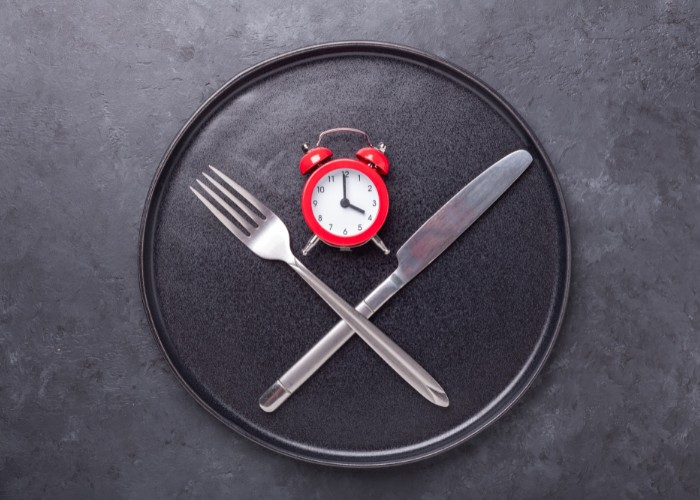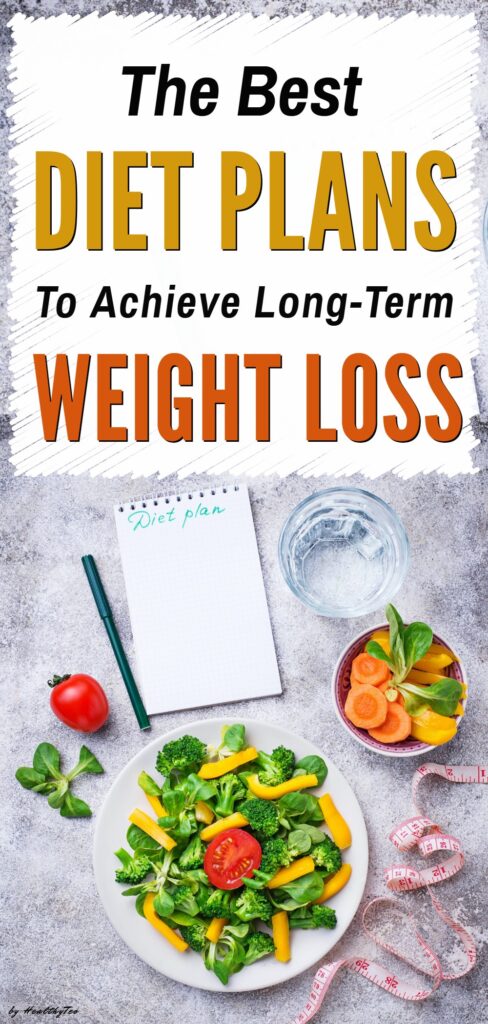Best diet plans to lose weight and how to find the best diet for you
Today there are many diet plans for weight loss and some of them are effective and based on research while there are many diets for weight loss that are fast and maybe not as effective for long-term weight loss results as their authors claim.
From all diet plans available today and their number is huge, we’ve collected for you the most researched and most effective. Here you can find out more about intermittent fasting, low-carb diets, low-fat diets, Mediterranean diet, paleo diet…
Losing weight is not easy and not all meal plans are equally effective when it comes to weight loss. While all diets for weight loss are different, they actually all sport the same fundamentals – and it’s a really simple calculation.
To lose weight you must consume fewer calories than you use. Yes, it’s really simple but in many cases, it is so hard to do it.
Maybe the hard thing is not doing, but staying on that track for a longer period is maybe the hardest thing to do. So, all weight-loss diets are built around creating a calorie deficit.
You should find a diet plan that doesn’t promote an extreme calorie deficit, which can negatively impact your health and often these diets give just short-term results, after a period of time you will back your previous pounds again.
Here are the best diet plans for weight loss that can help you to shed weight and improve your overall health. Find which one suits you and remember before making any changes in your diet it is good to consult with your doctor first.
Best diets that will help you to lose weight and improve your overall health
Intermittent fasting

Intermittent fasting is an eating pattern that is based on periods of eating and fasting. There are many methods of intermittent fasting. The most used is the 16/8 method which involves limiting your calorie intake for 8 hours a day.
This means that 16/8 intermittent fasting involves eating only during an 8-hour window during the day and fasting for the remaining 16 hours.
Another popular method of intermittent fasting is so-called the 5:2 diet. Also called the Fast Diet involves eating normally for 5 days a week and restricting your calorie intake from 500-600 for just 2 days a week.
There are many other methods of intermittent fasting which are more restrictive and give good weight loss results like the Warrior Diet, Eat Stop Eat Diet or Alternate Day Fasting.
How intermittent fasting works?
This eating pattern is based on restricting the time you are allowed to eat, which is a simple way to reduce calorie intake. There aren’t any restrictions on what kind of foods you can eat, you are restricted by the time when you will eat.
If you don’t compensate by eating too much food during your eating window, this is one of the best diets that can help you to lose weight.
How effective is intermittent fasting for weight loss?
There are some studies that confirm that intermittent fasting can help with weight loss. A systematic review of 40 studies found that intermittent fasting was effective for weight loss, with a typical loss of 7-11 pounds over 10 weeks.
When examing the rate of weight loss, intermittent fasting may produce weight loss at a rate of approximately 0.55 – 1.65 pounds (0.25 – 0.75 kg) per week.
People who practiced intermittent fasting also experienced a 4-7% reduction in waist circumference, which indicates that they’ve lost belly fat.
Intermittent fasting is one of the best eating patterns for weight loss, but not just that. Following this way of eating is very beneficial for your health. Also, calorie counting is not required when doing intermittent fasting, the weight loss is mostly mediated by an overall reduction in calorie intake.
If you decide to try one of the intermittent fasting methods for weight loss be aware that there are some possible side effects of following this eating pattern especially if you are a beginner.
To learn more about this visit this post: Intermittent Fasting Side Effects and How To Deal With Them.
Low-carb diets
A low-carb diet means that you consume fewer carbohydrates, found primarily in bread, pasta, or sugary foods. Instead of eating carbs, you eat whole foods including natural proteins, fats, and vegetables. Examples include the ketogenic (keto) diet, Atkins diet, and low-carb, high fat (LCHF) diet.
How do low-carb diets work?
Low-carb diets are typically high in protein, as protein can help to curb your appetite, raise your metabolism, and converse muscle mass. If we take a look at the keto diet which is a very popular diet for weight loss today.
In this very low-carb diet, your body begins using fatty acids rather than carbs for energy by converting them into ketones, a process called ketosis.
How effective are low-carb diets for weight loss?
Today low-carb diets are among the most popular diets for weight loss, and this is not a coincidence there are many studies that confirm this weight loss effects of low-carb diets.
According to a review of 53 studies that included 68,128 participants, low-carb diets showed significantly better results than low-fat diets. Further, low-carb diets appear to be quite effective at burning belly fat.
Are there any downsides to following a low-carb diet? – There are some cases where a low-carb diet raised LDL (bad) cholesterol levels, and in some very rare situations, a very low-carb diet can cause a situation known as ketoacidosis. Further, a very low-carb diet can be difficult to follow for some people because it’s restrictive.
Benefits of a low-carb diet – Except that this type of diet is one of the best and mostly used for weight loss, a low-carb diet brings other benefits. Shrinking fat stores, lower blood sugar, improve mental clarity and a calmer digestive system are the most frequently cited benefits of low-carb eating.
Low-fat diets
Low-fat diets restrict your fat intake usually to 30% of your daily calories, and some ultra low-fat diets aim to limit fat consumption to under 10% of calories. Ultra low-fat diets are mainly plant-based and limit meat and animal products.
Pros of a low-fat diet – Foods high in fat are usually high in calories. Reducing high-calorie foods will help you lose weight. Further, cutting out sweets and sodas can help you lose weight and it’s also great for your body too.
Cons of a low-fat diet – If you choose low-fat foods it’s easier to overindulge. The main reason for this is that low-fat versions don’t have the same satiating tastes and ingredients in them, and you’re more likely to reach for a second cookie or backed well when you think it’s lower in calories.
Further, low-fat foods are usually processed foods that are filled with unnatural ingredients designed to make low-calorie foods taste like their full-fat counterparts. These added ingredients can usually cause weight gain.
How effective is a low-fat diet for weight loss?
A low-fat diet can help you lose weight and here is evidence supporting this claim. A review including 33 studies with over 73,500 participants found that following a low-fat diet led to small but relevant changes in weight and waist circumference.
However, while low-fat diets are effective for weight loss, low-carb diets seem to be more effective and maybe that’s why low-carb diets are so popular today.
Plant-based diets
According to many people, the best diets for weight loss are plant-based diets. The most popular versions are veganism and vegetarianism, which as you know restrict eating animal products for ethical, health, and environmental reasons.
However, if you don’t want to exclude animal products from your daily meals, there is a more flexible plant-based diet such as the flexitarian diet.
The Flexitarian diet is a less rigid form of vegetarian diet, that encourages mostly plant-based foods and allowing to incorporate meat and other animal products into your meal plan, just in small quantities.
How effective are plant-based diets for weight loss?
Research shows that plant-based diets are effective for weight loss. A controlled trial published in 2016, involving 1,151 subjects found that people on a plant-based diet lost an average of 2 kilograms (4.4 pounds) more than those who included animal products.
Additionally, those following a vegan diet lost an average of 2.5 kg (5.5 pounds) more than people eating a plant-based diet.
The main reason why plant-based diets are effective for weight loss is that they tend to be rich in fiber, which helps you stay full longer, and also, they are low in high-calorie fat.
Pros of plant-based diets: A plant-based diet is often touted as the healthiest approach to eating, and its benefits extend way beyond weight loss. A plant-based diet is naturally low in fat and high in fiber. vegetarian diets are also linked to lower cholesterol and lower blood pressure.
Downsides of a plant-based diet: By simply eliminating animal products it doesn’t guarantee that you’ll eat wholesome, nutritious foods. High-quality animal meats provide nutritional benefits that are hard to replace naturally.
Especially vegans should be aware of this and should consider adding a supplement. Important nutrients found typically in animal products are iron, zinc, vitamin B12, vitamin D, and omega-3 fatty acids. A flexitarian approach can help account for these nutrients.
The Mediterranean diet

From many diet plans for weight loss, the Mediterranean diet is maybe not the first choice. This diet was designed primarily to lower heart disease risk but today many studies indicated that it can aid weight loss too.
Following the Mediterranean diet means eating in a way that the people in the Mediterranean region traditionally ate. This diet is on the top of the list recommended by Western medicine and is similar to Public Health England’s Eatwell Guide.
The key foods of the Mediterranean diet are lots of vegetables, oily fish and nuts, olive oil, with no calorie restrictions. Meals may include small amounts of fish, meat, or eggs.
Water and sparkling water are common drink choices, as well as moderate amounts of red wine. These combined with cutting down on sugar which was traditionally a rarity in the region, you’ve got the base of the Mediterranean diet.
Additionally, the Mediterranean diet restricts eating refined sugars, such as white pasta, white bread, and pizza dough with white flour.
Refined oils, which include soybean and canola oil are also restricted. Foods with added sugars, processed meats, processed or packaged foods are also not allowed.
Is the Mediterranean diet good for weight loss?
As we mentioned before, this diet was not designed specifically for weight loss. But many studies show that this style of eating may aid in weight loss.
A 2011 meta-analysis of randomized controlled trials, found that people who combined the Mediterranean diet with calorie restriction or exercise lost on average 4 kg ( 8.8 pounds) more than those on a control diet.
The Paleo diet
To start following this diet plan for weight loss you’ll have to take your plate back in time and give up all processed foods.
The Paleo diet is based on the eating patterns of our Paleolithic ancestors, this diet requires strict adherence to foods that would have been hunted and gathered. This includes lean meat, seeds, and nuts, fruits, and vegetables.
This eating pattern cuts out processed foods, and also eliminates dairy, beans, grains, and legumes. It’s based on the theory that modern diseases are linked to the Western diet, as proponents believe that our bodies haven’t evolved to process dairy, grains, and legumes.
Further reading: List Of Foods For The Paleo Diet: What To Eat and What To Avoid
Benefits of following the Paleo diet: Following this hunter-gatherer lifestyle can aid in getting more omega-3 fatty acids, more minerals, and protein, and more healthy fats overall in your diet.
Sugar is strictly forbidden and the diet relies on popular anti-inflammatory foods like wild-caught salmon, leafy greens and nuts, blueberries.
Downsides: This diet restricts several nutritious food groups, including whole grains, legumes, and dairy. While the elimination of processed foods is a good thing, the complete elimination of healthy whole grains can leave you without important vitamins and minerals.
Is it effective for weight loss?
Many studies have shown that the paleo diet can aid weight loss and reduce belly fat. A 3-week study from 2008 assessed the effect of the paleo diet on 14 healthy individuals.
The results showed that these individuals lost an average of 2.3 kg ( 5.1 pounds ) and reduced their waist circumference by an average of 1.5 cm (o.6 inches ). Further research suggests that this diet can be more filling due to its high protein content, than other popular diets.
Other diets that are popular today for weight loss
The Sirtfood Diet
This diet is popular today thanks to the famous English singer and songwriter Adele. The Sirtfood Diet is centered on eating sirtfoods, mostly plant-based and high in antioxidants foods. Here is a list of the top 20 sirtfoods.
This diet focuses also on drinking a lot of smoothies. The first phase of the diet involves a lot of green smoothies and restrict calories before you move into the maintenance phase.
Restricting calories will always result in short-term weight loss, but there are no independent studies backing up this diet.
You can find out more about the phases of the diet, what to eat and how to follow in this post The Sirtfood Diet: Lose 7 Pounds In 7 Days By Eating Chocolate.
The Mayr Method Diet
In the list of diet plans for weight loss, we must mention the Mayr Method Diet. This type of eating is popular today thanks to the dramatic change and weight loss of famous Australian actress Rebel Wilson.
This is more a combination of exercise and eating methods developed a century ago by a famous Austrian doctor.
The main principles of the Mayr Diet plan for weight loss are eating mindfully ( including chewing each bite of food at least 40 times), eating high-alkaline foods such as vegetables and fish, and reducing gluten and dairy.
The main downside is that you need to visit some of the Mayr clinics to get the full experience of this method that helps you to lose weight.
The Nordic Diet
Also called the New Nordic Diet is a Scandinavian eating style very similar to the Mediterranean diet. Developed by experts this eating style is based on getting more calories from plant foods and less from meat; more foods from the sea and lakes; more foods from the wild countryside.
When it comes to the weight loss effects of the Nordic Diet studies and experiences of people who tried this eating style show that you would probably lose weight in a slow steady way.
The downsides of this diet are that is time-consuming, the majority of what you eat should be prepared at home and organic products and fish can be expensive.
How to choose the diet that will help you to lose weight
There are many factors to consider when choosing a diet plan for weight loss that is suitable for you. You should look for a diet that can easily fit your eating preferences and your lifestyle too.
Further, select a diet plan that is backed by research and has been shown to be effective for weight loss.
Be sure to avoid diets that eliminate entire food groups and are very restrictive. You can’t expect good long-term results if you exclude some sort of food from your meals for a long period.
These restrictive diet plans are hard to follow for a longer period and they also make it much more difficult to get all the nutrients that you need.
You should also be cautious of programs and plans that require you to purchase expensive supplements and products to achieve results.
Sometimes even if you choose a diet plan for weight loss, maybe you won’t get the wanted results. If this happens to you maybe we can help. Here is an excellent post that will help you You Can’t Lose Weight? Here Is The Reason Why.
Finally, before making any changes to your diet the best thing to do is to consult with your doctor or nutritionist. This is especially important if you are taking any medications or if you have any underlying health conditions.

Final thoughts about diet plans for best weight loss results
Losing weight is not easy. Today there are many diet plans for weight loss, and this is good because you can choose from different plans and find one that is best for you.
Diets that we’ve mentioned up here like, plant-based diet, low-carb diets, low-fat diets, the paleo diet, Mediterranean diet, and intermittent fasting are well researched and have been shown to be effective for weight loss.
When you need to choose one of the diet plans for weight loss be sure that it fits your lifestyle and food preferences.
Don’t choose fast weight loss diets, any diet that allows you to lose weight quickly likely isn’t sustainable in the long run.
Remember, when you want to make a change in your diet, consult with your doctor first to be sure that your chosen diet is good for you and that you will have benefit from following it.




